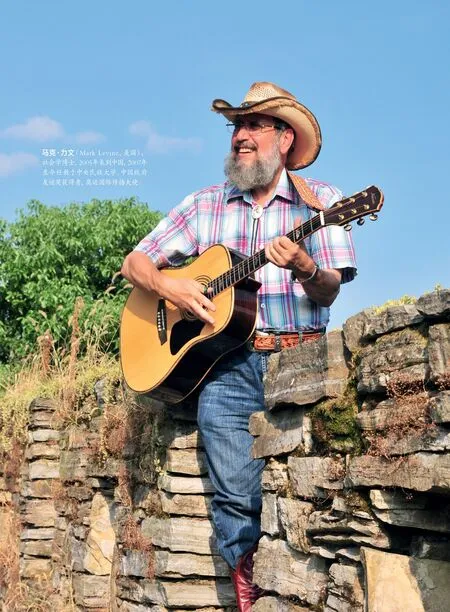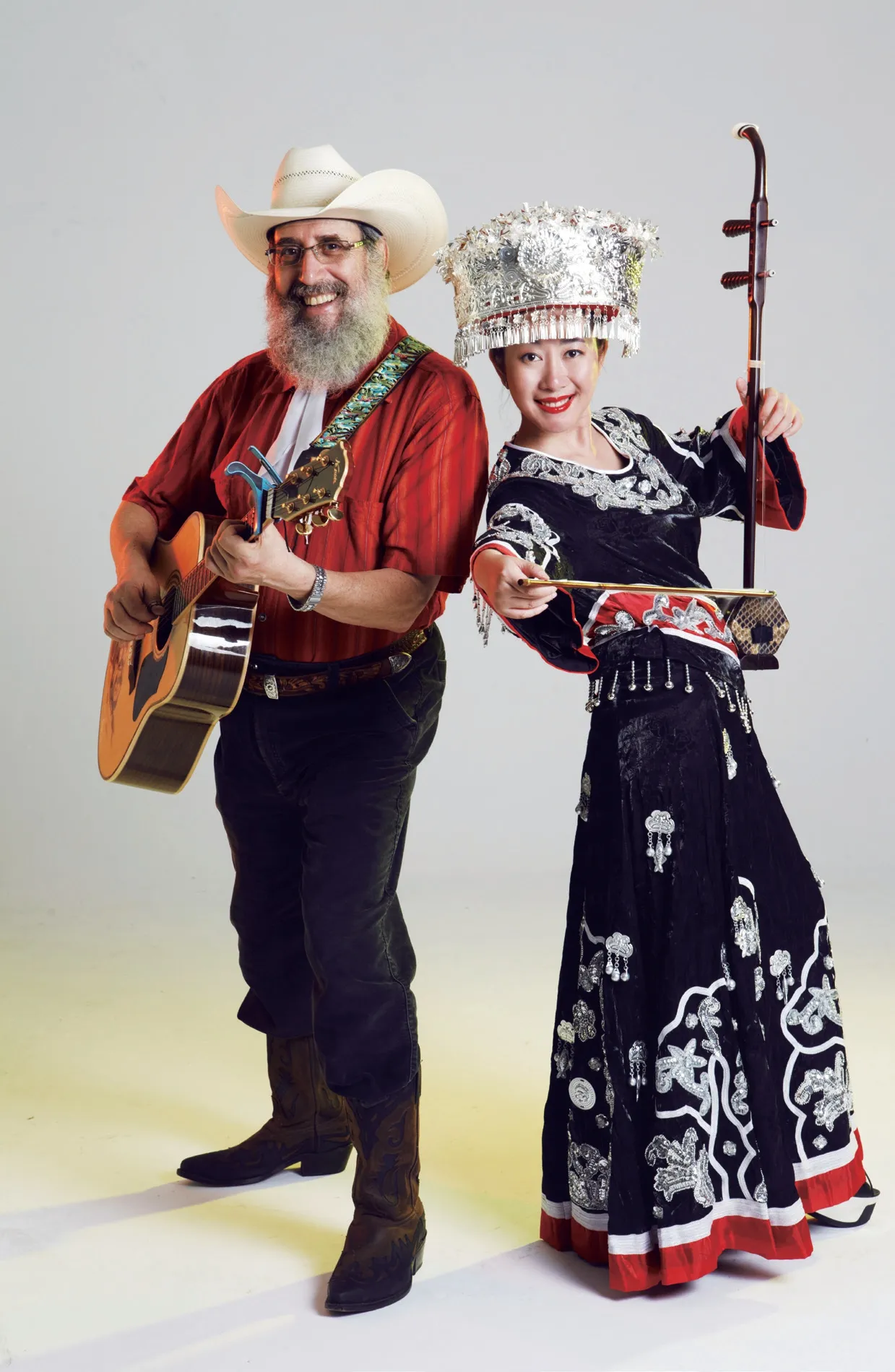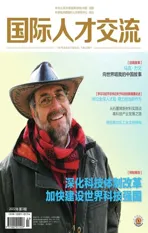马克·力文:向世界唱我的中国故事
2022-03-21王湘玥张晓
文、译/王湘玥 张晓
“这个世界上,没有什么地方比中国更让我愿意停留……我每天早上醒来都很幸福,因为我生活在中国。”马克·力文深情朗诵着自己新鲜出炉的原创吉他曲歌词。今年,已经是他来华的第17个年头了。
马克·力文是一位美国社会学家。2005年,他初次来到中国。先在江苏省淮安市教授了两年英语,后接受中央民族大学的任教邀请,搬到了北京,一待就是15年。在华生活期间,他创作了75首关于中国的美国乡村风格歌曲,任教超过65所中国大学,发表多篇文章,还撰写了几本著作,其中有两本是关于中国的。
在最新出版的英文图书Singing My China Stories to the world(《向世界唱我的中国故事》)一书中,他介绍了自己在中国生活的经历。该书在北京冬奥会主媒体中心等地供志愿者、媒体、游客阅读,获得了极大关注。本期,《国际人才交流》特别邀请马克谈谈这本新书和他的中国情缘。
为周总理奔赴淮安
在马克位于北京的家中,到处装饰着中国风的画作、摆件,书架上也满满当当地放着和近代中国相关的书籍,如英文版的《红星照耀中国》,多位外国老专家的著作《见证中国》《十里店——中国一个村庄的革命》等,还有近期几位在华外国专家写的有关中国的书,如聂子瑞的《太阳升起:“美国小哥”见证中国扶贫奇迹》。他的电脑桌前更是挂着一幅周恩来纪念馆的照片。“这里我一共去过五次,里边有一尊周总理坐姿的雕像。”他笑着回忆道。实际上,这位美国学者与中国故事的缘起与周总理有关。
社会学博士毕业后,马克在美国大学教了几年书,随后选择成为一名全职的社区工人组织志愿者,负责给如学生、小企业主、家庭主妇等其他志愿者进行政治教育。“因为当时有很多工人的工作条件都很艰苦,生活条件很差,薪酬很低。但能够参加工会的人只占一小部分。”为了让剩下的人也能够了解到自己的合法权利,为自己和他人争取权益,马克整整在这里干了29年。也正是在这段不断学习各国政治的过程中,他了解到全世界工人的抗争经历,包括中国共产党领导的中国工人,了解到毛泽东、周恩来等伟人的事迹,并深感于其不屈不挠、排除万难的精神和取得的伟大成就。特别赞赏中国共产党不靠侵害他人利益,坚持和平发展的理念。于是,他决定亲自来中国看一看。
在网站上大量投送工作简历后,他收到了很多来中国教英语的工作机会。他相中了一份淮安发来的英语老师的工作机会,因为那里是他尊敬的周总理的故乡。随后,他从书架上拿下了一份刊物,这是一份1977年出版的英文版《人民画报》,周总理的照片被用作了封面,还特意用塑料封装了。“我2005年来中国时行李并不多,但我带上了这本刊物。”来到淮安,马克对周总理有了更加深入的了解:“我知道周总理是很多外国友人的好朋友,他对外国朋友对中国作出的贡献非常看重,因此我愈发敬爱他。”
本来,马克只计划在中国待一年,后来事情发生了改变。在他第一年的一堂英文写作课上,马克要求学生阅读英国哲学家伯特兰·罗素暮年撰写的《我为什么而活》一文,并畅想自己60年后是什么样子,写下自己的“为什么而活”。除了三个人写到了要帮助残疾人、缩小城乡差距外,75个学生中有72人都写的是想让自己和家人拥有更美好的生活。那一刻,马克感受到了自己必须留下来。他想要告诉孩子们,这还远远不够。是的,这个答案虽然不是错的,但他希望人们不要总是关注自己,我们不能忘却那些没有我们幸运的人们,那些没有享受到我们拥有的资源的人。“就像中国共产党的建立者们是为了整个民族的幸福而奋斗,所以才让今天的你们有了受教育的机会。”有着这样崇高的理想的马克后来还带过很多学生们去烈士纪念馆,告诉他们那里长眠的战士很多和他们一般大,只有十七八岁,他们都是为了建设新中国而牺牲的。马克欣慰地回忆,参观结束后,很多人告诉他:“谢谢你带我来这里,我自己是不会想着要来的,我学到了很多,也很高兴自己来了。”
为无穷的远方扎根民大
在淮安的任期结束后,马克同时收到了位于北京的清华大学和中央民族大学(以下简称“民大”)的任职邀请。稍加思索后,他便选择了后者。关于理由,他是这么说的:“我做了近30年社区服务,无论我走到哪里,都希望为当地人们作出贡献。而我知道,清华的孩子们没有我也会有灿烂的人生。所以我要来民大,这所为少数民族学生开设的学校。因为在这里,我更能发挥作用,我能够教给这些孩子知识,当这些孩子回到自己的家乡,他们可以用自己所学作出贡献。”他还坚定地说:“英文里有个概念,secondguessing,是指人们在做出选择后,会担心放弃的那个是不是才更好?但我在选择民大、放弃清华后从来没有这样的感觉。”


马克(左)和他的中国朋友傅涵组成了一个名为“秀外慧中”的乐队
在中央民族大学任教的15年里,他感触最深的就是各民族学生、老师之间的和谐氛围。“羌、苗、壮、蒙、藏、满、布依、朝鲜……”他字正腔圆地用中文说起了好多少数民族的名字,“中国是个多民族国家,这里的学生70%以上都是少数民族。在美国,人们不理解中国作为多民族国家是什么样的,如果听到一些故事,也一般是有关冲突的。我曾参与中国教育部对民大的评审,评审专家团队还有两位美国人,一位说这里有来自中国各少数民族的学生和教师,问民大如何处理师生间的种族冲突。我回应说,在民大十多年我既没见过也没听说过校园里发生过任何种族冲突事件。15年来,看见的是来自不同文化背景的孩子们和谐地在课内和课外一起学习、玩耍、吃饭、购物。如果同学或者室友中有一个是穆斯林,他们就会选择去学校或者附近的清真餐厅吃,我还看到学生去西藏、新疆等地的少数民族地区进行暑假学习,去哈萨克斯坦的大学交流学习。”
“我们大学有一个博物馆,里面有几个少数民族文化展览馆。来自不同民族、专业和地方的学生们会作为讲解员向参观者们介绍中国少数民族的特色服饰、习俗等。有的孩子会用英文完成,我就帮他们改善英文讲解词。这么多年下来,加上我的旅行见闻,让我了解了中国文化的多样性。”他说。
在2016年拿到绿卡后,马克在中国的工作和生活更加便利了。“绿卡让我的生活和工作没了年龄限制。甚至我不工作也可以待在这里。但是我非常想要继续在民大教书。”他这样描述自己和民大多年来的情谊:“这里是我工作的地方,是我的家。我和我的同事,包括很多学生都有深厚的友谊。我的厨房里还有朋友送来的胡辣汤呢。”他的脸上露出了笑容。
歌唱中国
马克的客厅专门有一隅是留给音乐创作的。在这个角落里,可以看到一把吉他,一个谱架,一个立式麦克风,很多书和写着歌的笔记本。马克从九岁开始弹吉他,但一直没有作品。“离开淮安时,我心血来潮写了第一首《淮安,未来的希望》”,从此他开始写歌,歌唱中国和他在中国的生活。“2013年,周总理诞辰115周年,我唱了这首关于淮安的歌,随后有人上台向我敬了一杯白酒,我才知道他们是周总理的侄女周秉德与她的兄弟。翻译告诉我说,周女士很惊讶一个外国人能够创作一首‘如此美丽的关于中国的歌曲’。几年后她还邀请我在国家大剧院的周总理诞辰活动上演出,那真是令人激动。”
2013年,马克和他的中国朋友、自小学习二胡的傅涵女士组成了一个名为秀外慧中的二人组合,中西结合,在国内各地演出。“我们这个组合的英文名字是In Side Out,直译就是(把衣服)从里边翻到外边,但还是同一件衣服。我们表演了很多中国名曲,如《敖包相会》,但我们会作出一些改变,比如在《敢问路在何方》的曲子中用二胡演奏出马咆哮的声音。我们希望能更加吸引外国朋友,让大家喜欢听,并产生兴趣了解中国的音乐。”
马克还曾为汶川地震、北京奥运会、新冠肺炎疫情和中国共产党成立100周年等事件写歌,根据自己的所见所闻有感而发,尤其赞扬中国人民团结在一起共克时艰的精神状态。其中,《为志愿者欢呼》这首歌称赞的是2008年奥运会的志愿者们。“这首歌就是我的亲身经历,我不知如何入场、找座位,都是志愿者主动过来帮我搞定,他们无处不在,总是热心帮助他人、指引方位、答疑解惑。”
“有趣的是,这次北京冬奥会,我有很多学生就是志愿者。他们传回给我照片,我才惊讶地发现他们手里拿着我的书。原来我的新书《向世界唱我的中国故事》在冬奥会的主媒体中心是免费提供给志愿者、媒体取阅的,应该是认为我写得很好吧。”他笑着说道。
马克表示,这本书以及他写的歌都是为了破除国外媒体对于中国的刻板印象和不实报道,把真实的中国展现给世人。“冬奥期间,我每天都会看新闻,有时候也会忍不住因为外媒对中国的抹黑感到生气。网上充满着太多虚假信息和误解,我常常说,破除偏见最好的方法就是亲自来中国看看。我曾三次参加张家界国际乡村音乐周。在那里,我遇到了一位美国吉他手,他告诉我看到真正的中国让他既惊讶又高兴,这里有一片广阔天地,和一些媒体说的根本不一样。他还说,等他回去之后,有太多的故事要告诉别人。我希望疫情过去后,有更多的外国人能来亲眼看看,看看真正的中国,然后把这些真实的经历带回去。”
聊到近年来中国的变化,马克觉得他有话要说。“在中国这么多年,我目睹了很多变化。包括脱贫、高铁的发展、街道的清洁度等。以前我有一次坐了整整24小时硬座到广州去,现在只要5小时之内的旅程,我都会选择高铁,因为又舒服又便捷。还有,以前我家门口的街道早上总是很脏,地上有很多垃圾,但现在很干净。”他又思索了一下,然后神秘地笑了笑:“我的学生身上的最大变化就是他们对于自己的国家越来越自豪了,也更加自信。”他还高兴地提到一个和冬奥有关的变化:“我这周才知道,现在有一些原外国籍运动员能够很自豪地代表中国参加奥运会,我认为这是一件很迷人的事情。十年前这些都是不可能想象得到的。”
最后,马克高度赞扬了习近平主席提出的“人类命运共同体”的概念。对于个人,他希望,每个人能将自己的梦想和国家的融合在一起,让个人和时代的脉搏同呼吸共命运。“不要总想着自己能得到什么,要主动想着自己能为别人付出什么。这样,我们才能一起收获幸福。”
“There is no place else in the world that I would rather be. The People’s Republic of China is the place I want to be…When I wake up in the morning in the PRC, I’m happy, because there is no where else in the world I would rather be. “Mark Levine sincerely recited the newly-written lyrics for his original guitar song. This year is his seventeenth year in China.
Mark Levine is an American sociologist who came to China to teach English in 2005. Spending his first two years in Huai’an city, Jiangsu Province, he moved to Beijing two years later when offered a position at Minzu University of China (MUC) where he is still teaching 15 years later. Through these years, he has written 75 American Country/Folk style songs all about China,lectured at nearly 65 different Chinese universities, published many articles and authored several books, among which two were about China.
, Mark’s most recent book about China and his life here, gained great prominence when 2000 copies were free of charge to media, volunteers and other visitors to the Main Media Center of the 2022 Beijing Olympics and Paralympics.magazine invited Mark to talk about his new book and his story.
Teaching in Huai’an with the Respect for Premier Zhou
In Mark’s home in Beijing, Chinese-style paintings and decorative items can be seen everywhere. His bookshelves are also filled with books about modern China, such as the original version ofand, which are written by the famous foreign experts Israel Epstein and Isabel Crook, and also several recent books about China by foreign experts, for example,by Erik Nilsson. It’s worth mentioning that in front of his computer desk, hangs a picture of the Memorial Hall of Premier Zhou Enlai. “I’ve been there five times. There is a stature of Premier Zhou in his sitting position,” he recalled smiling. In fact,the origin of this American scholar’s China story has something to do with Premier Zhou.
After graduating with a Ph.D. in sociology, and a couple years of university teaching, Mark chose to become a full-time volunteer in a community-based labor organization, working asan organizer and providing political education for other volunteers including students, small business owners, housewives and others. “Many workers at that time had to struggle with bad working conditions, poor living conditions, low wages,etc. The US labor laws only allow a small number of them to join a labor union.” In order to let the rest of the people know about their legal rights and fight for their own and common interests, Mark worked there as a volunteer for 29 years. It was also this process of constantly studying the politics of various countries that helped him learn about the struggles of other workers around the world and including those led by the Communist Party of China, and the great deeds of Chairman Mao Zedong, Premier Zhou Enlai and other party leaders. Deeply impressed by their indomitable will and amazing achievements, especially the concept of peaceful development,he decided to come to China and see it in person.
By posting resumes on a website, Mark got several offers to come to China and teach English. He picked the invitation from Huai’an because it was at the hometown of Premier Zhou, whom he admired. When talking about this, he took out a magazine from the bookshelves, which was a print of China Pictorial, published in 1977 with Premier Zhou’s photo on its cover, and was even plastic-coated. “I didn’t bring much baggage to China in 2005, but I carried this.” After arriving in Huai’an, he gained a deeper understanding of Premier Zhou, learning more about his friendship with foreigners and respect for the contributions they had made to China. Mark’s respect for Zhou grew.
Coming to China, Mark was intending to stay for only one year,but things changed. In one of his English writing classes during his first year, Mark asked the students to read “What I lived for”, an essay written late in life by the British philosopher Bertrand Russell. He then asked them to imagine themselves 60 years in the future, and write their own, “What I lived for” . Except for three students who wrote about helping the disabled people and narrowing the gap between rural areas and cities, 72 of the 75 students only wrote about wanting to have a better life for themselves and their families. It was at this moment that Mark felt he had to stay. He wanted to tell his young adult students that it wasn’t enough, that although their answer wasn’t wrong,they shouldn’t only focus on themselves, they couldn’t forget those who weren’t as lucky as them, those who weren’t enjoying the resources they had. He gave an example: “Just like the founders of the Communist Party of China didn’t only strive for themselves, but also for the happiness of the entire nation. And that’s why people (including his students) have the opportunity to be educated today.” Thus, with such noble dream, besides his classes, Mark later took many students to various memorial halls, telling them that many of the soldiers who lay there were around their age, only 17-18 years old, when they sacrificed their lives to build New China. After these visits, many of those young Chinese would tell him: “Thank you for bringing mehere Mark, I would never have come by myself but learned a lot and am glad that I came.”
15 Years in MUC: the Infinite Distance and Countless People are All Related to Me
At the end of his teaching in Huai’an, he received invitations from Tsinghua University and Minzu University of China at the same time, both located in Beijing. After a brief consideration, he chose the latter. As to why, he said this: “I had been doing community service for nearly 30 years, wherever I go, I don’t like being an outsider, I want to make a contribution. And I knew that the students of Tsinghua would have a wonderful life without me. So I had to come to Minzu University, a school for minority students, where I could contribute more by teaching things to these students that they could bring back to their home town.”He then proudly added: “There is a concept called second-guessing in English, which means to feel unsure about one’s decision after making a choice, wondering if the other option is actually better. But through all those years, I have never second-guessed my choice of choosing MUC and giving up Tsinghua.”
During the fifteen years of teaching at Minzu University of China, he was most impressed by the harmonious atmosphere among the students and faculty of all Chinese ethnic groups.“Qiang, Miao, Zhuang, Meng, Zang, Man, Buyi, Chaoxian,”he mentioned many Chinese ethnic minorities in correct and beautiful pronunciation, “China is a multi-ethnic country,and more than 70% of the students here are ethnic minorities.Often in the US, people do not understand China as a multiethnic country and if we hear of different ethnic groups, the story is usually one of conflict. I once participated in an evaluation program of undergraduate education at MUC conducted by the Ministry of Education of China. There were two American experts in the evaluation team. One of them asked about how students and teachers from various ethnic groups deal with racial conflicts here. I answered that I have never heard or seen any ethnic conflict through out all these years. All I saw was students of different Chinese ethnic groups studying together and outside of class, studying, playing, eating, go shopping together with no conflict. And if there was a Muslim in the class or the dormitory, they would eat together in the halal canteen or at similar restaurant nearby. I have also seen students go to Tibet, Xinjiang and other ethnic minority areas for summer study, and to universities in Kazakhstan for exchange studies.”
There is also a museum with several exhibition halls of ethnic minorities’ culture in our university. Students of different ethnic groups, majors, from different parts of the country will serve as docents to introduce the characteristic costumes, customs, etc. of different Chinese minorities to museum visitors.Sometimes they have to conduct these tours in English, so I volunteered to help. Thanks to this experience, as well as my travels around China, I have been able to learn about the great cultural diversity in China.” He said.
After getting a Chinese green card in 2016, Mark’s work and life in China have become more convenient. “The green card allows me to live and work with no age limitation. Also, I could live here without working but I am very eager to continue teaching at Minzu University,” He said when describing his deep commitment with his university: “It is my home as well as my job.I have great friendship with my colleagues and many students.I even have Hula soup from my friends in the kitchen.” The warm smile on his face moved us.
Singing My China Stories to the World
A corner in Mark’s living room is specially reserved for music.Here, you can see a guitar, a music stand, a microphone and many books and notebooks with songs. Mark has been playing guitar since he was nine years old, but he always played others’ songs. “When I left Huai’an, I wrote the first song:.” From then on, he started writing songs about China and his life here. “In 2013, the year of the 115anniversary of Premier Zhou’s birth, I performed this song about Huai’an.Afterwards, two people came to the stage to toast me with a glass of Baijiu, it turned out that they were Premier Zhou’s niece, Zhou Bingde, and her brother. The translator told me that she was amazed that a foreigner could write such a beautiful song about China. Remembering this, years later she made sure that I was invited to perform at Premier Zhou’s birthday celebration at the National Center for the Performing Arts,” he recalled, “that was very exciting.”
In 2013, he formed a musical duo called “In Side Out” with his Chinese friend, Ms. Fu Han, who began studying erhu at a young age. This combination of Chinese and Western music has performed all over the country. “Our English name literally means to turn the clothes inside out, but it’s the same clothes.We have performed a lot of famous Chinese songs, such as, but we would make some changes, such as playing the sound of horse roaring with the erhu in the song. We hope to attract more foreign friends. We have to make people like listening to Chinese music, then they will be interested in learning about it.”
Mark has also written songs about the Wenchuan earthquake,the Beijing Olympics, COVID-19, and the 100th anniversary of the founding of the Communist Party of China. They all talk about the cohesion and resilience of the Chinese people. Among them, the songpraised the volunteers who were distributed throughout Beijing during the Olympic Games, in 2008. “This is based on my personal experi-ence, I didn’t know how to enter the stadium nor find my seat,so the volunteers came to help me out. They were everywhere,eager to guide passengers and answer their questions. “
“A very exciting thing during the 2022 Olympics was that many of my students who were volunteering at the Beijing Winter Olympics this year sent me photos, and I was surprised to find out that they were holding my book. It turned out that my new bookwas distributed to volunteers, media and others who visited the media center. I suppose that means they thought I did a good job.” He laughed.
Mark said that the book, as well as the songs he wrote, are all aimed at straightening up the image of China that was distorted by western medias and showing the real China to the world.“During the Winter Olympics, I watched the news every day,and sometimes I couldn’t help but get angry at the western media. The Internet is full of misinformation and misunderstandings, I often say that the best way to break these prejudices of China is to come here to see by yourself. I participated in the Zhangjiajie International Country Music Week three times.There, I met another American guitarist, who told me that he was happily surprised to see the real China, there was a whole world out here, and it was not at all what the media says. He also said that there were too many stories to tell when he went back. I hope that when the epidemic is over, more foreigners can come, see the real China, and then bring these real experiences back to their countries.”
When it comes to the changes in China, Mark felt he had something to say. “Over the years, I have witnessed many changes,including poverty alleviation, the development of high-speed rail, the cleanliness of the streets, etc. For example, I once took a hard seat train of 24 hours to Guangzhou, can you imagine that!Now, as long as the journey is within 5 hours, I will choose the high-speed rail, after all, it is comfortable and convenient. Also,the street in front of my building used to be dirty in the morning, garbage was everywhere, but it is very clean now,” he then smiled mysteriously, “As for the students, the biggest change is that they are prouder of their country and more confident in the future of China and themselves.” There was also a change related to the Winter Olympics. “I only learned this week that there are now some foreign athletes who would proudly represent China in the Olympic Games, which I think is very fascinating.It was impossible to imagine ten years ago.”
In the end, Mark highly praised the concept of “community with a shared future for mankind”, proposed by President Xi Jinping. And when it comes to Chinese dreams of individuals,he hopes that everyone can combine their own dreams with the country’s dream, so that individuals and the community can share their pulse and breath. “Don’t always think about what you can gain from it, think about what you can give for others.Only in this way, can everyone acquire happiness.”
